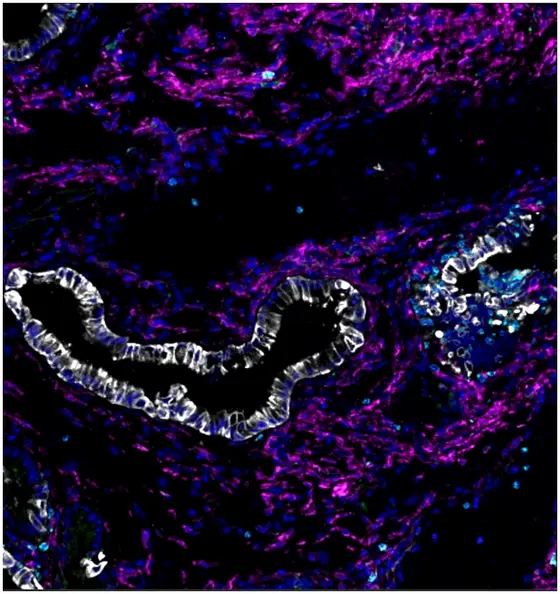There have been no major improvements in the treatment of pancreatic and biliary tract cancer in the last decades and no effective targeted therapies are available to date. “The situation for patients with pancreatic and extrahepatic bile duct cancer is still very depressing with approximately only 10% of patients surviving five years,“ says Dieter Saur, DKTK Professor for Translational Cancer Research at TUM's university hospital Klinikum rechts der Isar, DKTK partner site Munich.
DKTK is a consortium centered around the German Cancer Research Center (DKFZ) in Heidelberg, which has long-term collaborative partnerships with specialist oncological centers at universities across Germany.
“To discover novel therapeutic strategies that improve prognosis of these patients, it is essential to understand the fundamental genetic networks and interactions that drive these tumors in a tissue-specific fashion. This will allow highly precise molecular interventions in future.“
The research team looked at the development of biliary tract and pancreatic cancer in mice, replacing the normal “oncogenes“ PIK3CA and KRAS with a version containing a mutation identical with that in human cancers. Expression of these oncogenes in the common precursor cells of the extrahepatic bile duct and the pancreas led to very different outcomes. Mice with the mutated PI3K gene developed mostly biliary tract cancer, mice with the mutated KRAS gene instead developed exclusively pancreatic cancer.
This was unexpected because both genes are mutated in both human cancer types. Subsequent analyses discovered the fundamental genetic processes underlying the differential sensitivity of the different tissue types towards oncogenic transformation.
“Our results are an important step toward solving one of the biggest mysteries in oncology: Why do alterations of certain genes cause cancer only in specific organs?“ says Chiara Falcomatà the first author of the new publication. “Our studies in mice revealed how genes co-operate to cause cancer in different organs. We identified main players, the order in which they occur during tumor progression, and the molecular processes how they turn normal cells into threatening cancers. Such processes are potential targets for new treatments“.
In the mice, the team uncovered a stepwise process of genetic alterations, which drive the development of these cancer types. Some cooperating genetic events overactivate the PI3K signaling pathway, making them cancerous. Others disrupt regulators proteins, inactivating their ability to suppress cancer progression.
“Understanding the genetic interactions in different cancer types will guide more precise therapeutic decision making in the future“ says Günter Schneider, Professor for Translational Cancer Research at the University Medical Center Göttingen. “Our ability to engineer specific genetic alterations in mice allows us to study the function of cancer genes and to model specific cancer subtypes. Such mouse models are also invaluable for testing anticancer drugs before using them in clinical trials“.
“What we showed is that the function of an oncogene is different depending on the tissue type and what other genes are altered,“ says Roland Rad Professor at TUM and a DKTK researcher. “These oncogenes need to hijack the intrinsic signaling network of a specific tissue to allow cancer development. Interestingly, such networks exist only in specific tissue types making them susceptible for cancer development.“
These findings have important implications for therapeutic interventions. “The concept that multiple tissue-specific genetic interactions drive cancer progression demonstrates that no single gene can predict responsiveness of a cancer to a particular therapy,“ says Saur. “In future, it is key to mechanistically understand the tissue specific determinants of therapeutic response and resistance to get precision medicine to the next level.“
Several of the authors including Dieter Saur and Roland Rad are based at TranslaTUM, TUM's Center for Translational Cancer Research. In this interdisciplinary research institute, doctors work with colleagues from the fields of natural sciences and engineering on research into causes, diagnostics and potential treatments of cancerous diseases.
Chiara Falcomatà, Stefanie Bärthel, Angelika Ulrich, Sandra Diersch, Christian Veltkamp, Lena Rad, Fabio Boniolo, Myriam Solar, Katja Steiger, Barbara Seidler, Magdalena Zukowska, Joanna Madej, Mingsong Wang, Rupert Öllinger, Roman Maresch, Maxim Barenboim, Stefan Eser, Markus Tschurtschenthaler, Arianeb Mehrabi, Stephanie Roessler, Benjamin Goeppert, Alexander Kind, Angelika Schnieke, Maria S. Robles, Allan Bradley, Roland M. Schmid, Marc Schmidt-Supprian, Maximilian Reichert, Wilko Weichert, Owen J. Sansom, Jennifer P. Morton, Roland Rad, Günter Schneider, Dieter Saur: Genetic screens identify a context-specific PI3K/p27Kip1 node driving extrahepatic biliary cancer
Cancer Discovery 2021, DOI: 10.1158/2159-8290.CD-21-0209
A picture is available for download:
PDAC2.jpg
Caption: Pancreatic Cancer, induced by activation of the PIK3CA oncogene
Note on use of images related to press releases
Use is free of charge. The German Cancer Research Center (Deutsches Krebsforschungszentrum, DKFZ) permits one-time use in the context of reporting about the topic covered in the press release. Images have to be cited as follows: “Source: T. Santos/DKTK & TUM“.
Distribution of images to third parties is not permitted unless prior consent has been obtained from DKFZ's Press Office (phone: ++49-(0)6221 42 2854, E-mail: presse@dkfz.de). Any commercial use is prohibited.



